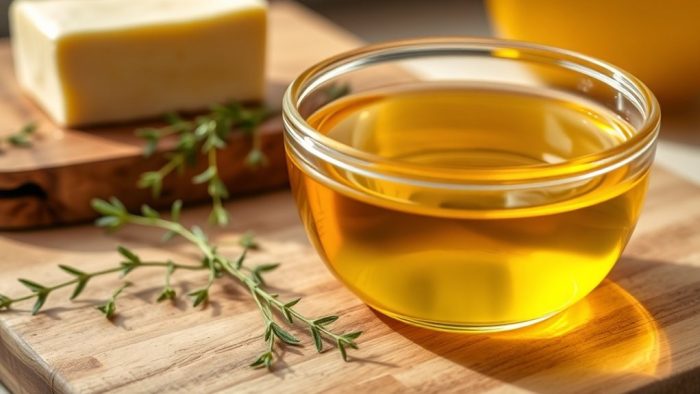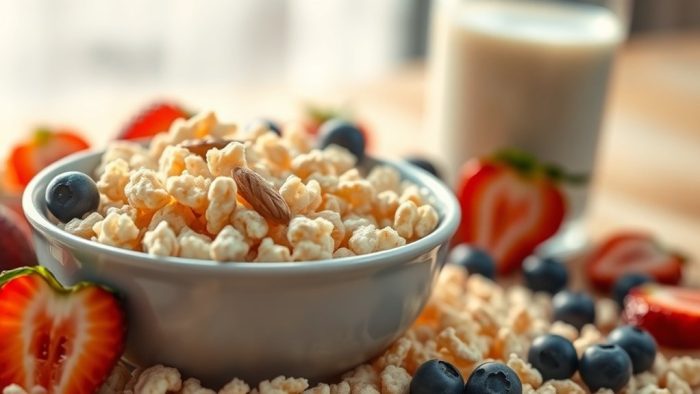Is Mustard Vegan
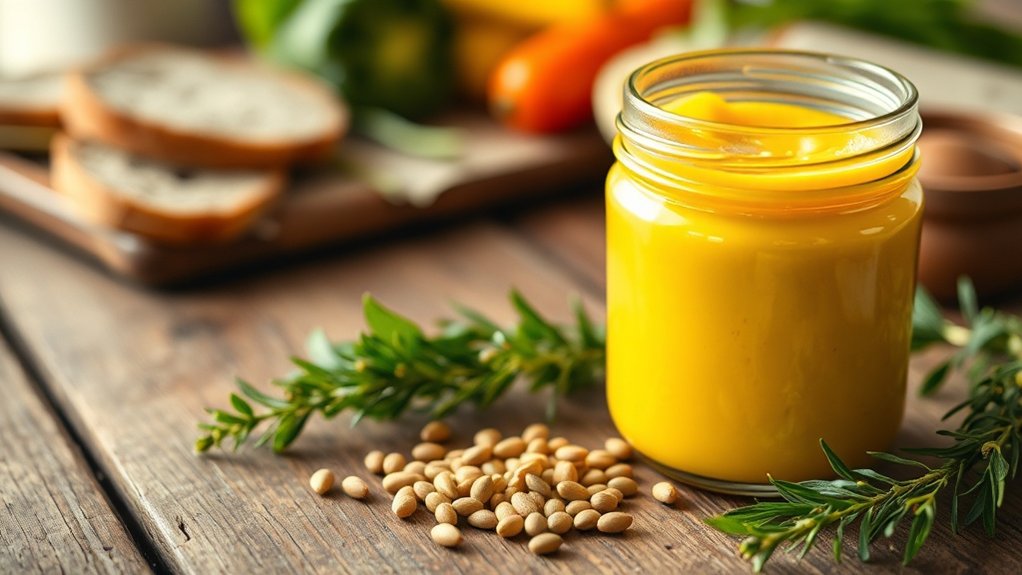
Most traditional mustard varieties you’ll find are vegan-friendly, including yellow, spicy brown, and many Dijon mustards made from mustard seeds, vinegar, and spices. However, you’ll need to avoid honey mustard, which contains animal-derived honey. Some Dijon brands use wine filtered through animal products, and certain mustards contain bone char-refined sugar. Always check ingredient labels and look for certified vegan logos to confirm your mustard is truly plant-based, as processing methods and brand formulations vary considerably.
Understanding Mustard: What It Is and How It’s Made
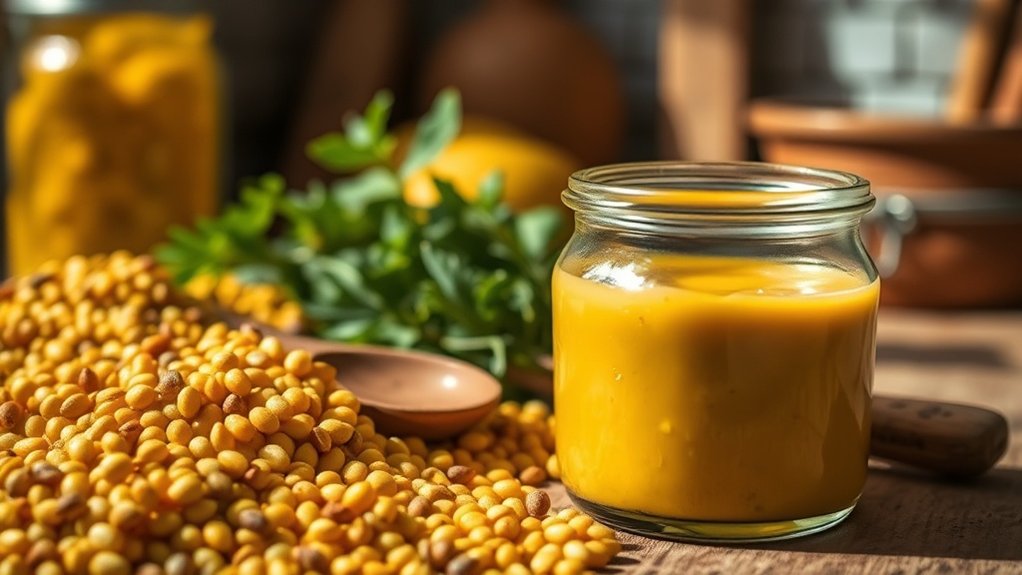
Mustard ranks among the world’s oldest condiments, with archaeological evidence tracing its use back thousands of years.
You’ll find it’s created primarily from mustard seeds sourced from black, yellow/white, and brown mustard plants. The production process involves steeping these seeds in liquid—typically vinegar or wine—then grinding them into a paste with added spices and salt.
Different types of mustard emerge based on which seeds you use and what ingredients manufacturers add. Yellow mustard offers mild flavor, while brown varieties provide more heat.
Dijon mustard, made with brown or black seeds and white wine, delivers distinctive sharpness. The flavor spectrum ranges from sweet to spicy, depending on additions like sugar, honey, or various acids.
You can even make homemade versions by soaking, blending, and seasoning seeds yourself.
The Vegan Status of Different Mustard Varieties
When examining mustard’s vegan credentials, you’ll uncover that most traditional varieties pass the test with flying colors. Yellow and spicy brown mustard typically contain only mustard seeds, vinegar, and spices—making them naturally vegan-friendly options.
However, you’ll need to exercise caution with certain varieties. Honey mustard isn’t vegan due to its animal-derived sweetener, while Dijon mustard sometimes contains white wine processed with animal-derived agents.
Additionally, some brands use white sugar refined through bone char, compromising their vegan status. To guarantee you’re selecting vegan mustard, carefully review ingredient labels or choose certified vegan products.
You can also create homemade versions using agave syrup instead of honey or selecting wines confirmed as vegan-friendly for Dijon preparations.
Non-Vegan Mustard Types and Ingredients to Avoid
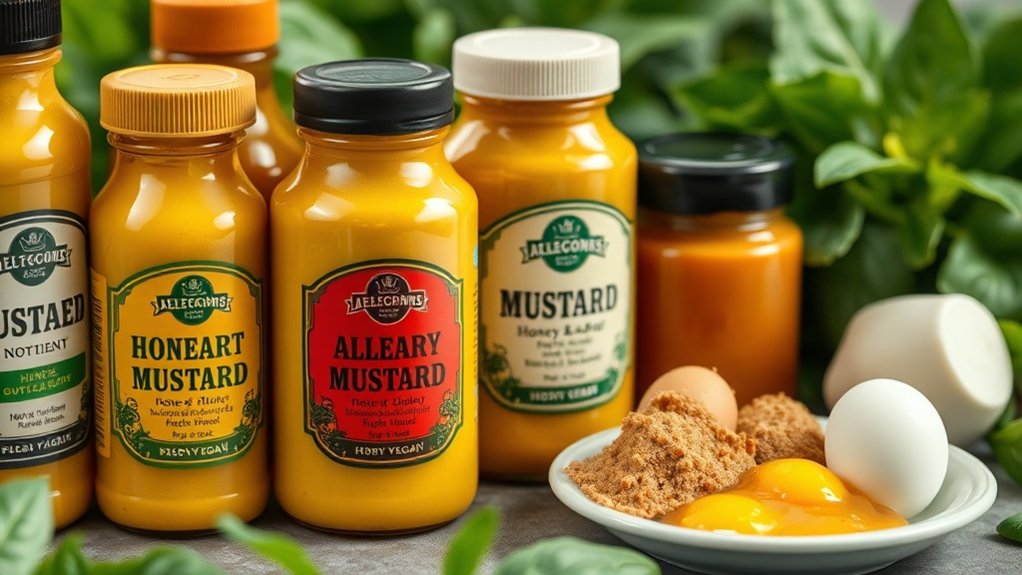
While most plain mustards align with vegan principles, several varieties contain problematic ingredients that compromise their plant-based status.
Honey mustard represents the most obvious non-vegan mustard type, as it directly incorporates honey—an animal product extracted from bees.
You’ll also need to scrutinize traditional Dijon mustards, since they often contain white wine that’s been filtered through animal-derived agents during processing.
Beyond these common varieties, watch for mustards with verjuice from unripe grapes, which undergo similar non-vegan filtering processes.
Additionally, some brands use sugar refined with bone char, introducing animal-based ingredients into otherwise plant-friendly formulations.
Since processing methods vary considerably between manufacturers, you should always verify vegan certification on labels rather than assuming any mustard variety is automatically suitable for your dietary requirements.
Complete Brand Verification Guide for Vegan Mustard
You’ll need a systematic approach to verify whether your mustard is truly vegan, starting with carefully examining ingredient labels for hidden animal-derived additives like honey, anchovies, or dairy products.
Look for certified vegan logos from organizations like Vegan Action or The Vegan Society, which guarantee products meet strict vegan standards through third-party verification.
When labels are unclear or you’re uncertain about processing methods—particularly regarding wine filtration or sugar refining—don’t hesitate to contact manufacturers directly for confirmation about their production practices.
Reading Ingredient Labels Correctly
Most commercially available mustards contain just four basic ingredients—mustard seeds, vinegar, salt, and spices—making them naturally vegan.
However, you’ll need to scrutinize labels for hidden animal-derived components. Watch for honey, which disqualifies products from vegan status, and check if the mustard contains wine or verjuice, as these may use animal-based filtration methods.
Sugar source matters—conventional white sugar often involves bone char processing, while organic sugar remains consistently vegan.
Look for explicit vegan certifications on packaging, which confirm third-party verification of ingredients and manufacturing processes.
When examining ingredient lists, prioritize products with straightforward formulations.
Brands like Annie’s Naturals and Grey Poupon have established reputations for transparency, making them reliable benchmarks when evaluating unfamiliar options.
Certified Vegan Label Standards
Beyond reading labels yourself, vegan certification marks provide independent verification that mustard products meet established plant-based standards. When you spot logos from the Vegan Society, Vegan Action, or Plant Based Foods Association, you’ll know these brands have undergone rigorous third-party evaluation.
These organizations examine every aspect of the production process, from ingredient sourcing to manufacturing protocols, making certain no animal-derived components or cross-contamination occurs.
Each certified vegan label represents adherence to specific guidelines covering transparency in sourcing, processing methods, and packaging practices. Brands voluntarily pursue this certification to demonstrate their commitment to vegan-friendly standards and build consumer trust.
You’ll find these verification marks clearly displayed on compliant mustard products, eliminating guesswork about potentially hidden non-vegan additives and providing confidence in your purchasing decisions.
Contacting Manufacturers Directly
When manufacturers don’t provide complete ingredient transparency on their labels or websites, direct communication becomes your most reliable verification tool.
Contacting manufacturers directly allows you to clarify your mustard’s vegan status through specific inquiries about hidden animal-derived ingredients.
Effective Verification Steps:
- Ask about specific ingredients like honey, wine, anchovies, or bone-char processed sugar that may not be obvious on labels.
- Inquire about cross-contamination practices in facilities that also process animal products.
- Request information on processing aids and filtering agents used during production.
- Use multiple contact methods including email, phone, or social media for faster responses.
Most manufacturers respond promptly to consumer questions and can provide detailed ingredient sourcing information.
Document their responses for future reference when making purchasing decisions.
Reading Mustard Labels: Identifying Hidden Animal-Derived Ingredients
You’ll need to watch for honey in honey mustard varieties, as it’s an animal-derived product from bees.
Dijon mustard often contains wine, which may be processed using animal-derived fining agents. Sugar presents another concern—unless it’s organic sugar or carries vegan certification, it might be refined with bone char.
Verjuice, a wine-like ingredient in some mustards, can also undergo non-vegan filtering processes.
While xanthan gum is typically plant-based, you should verify the complete ingredient list.
Look for products with clear vegan labeling or contact manufacturers directly when ingredients are ambiguous, making sure your mustard aligns with your dietary principles.
Production Methods and Their Impact on Vegan Status
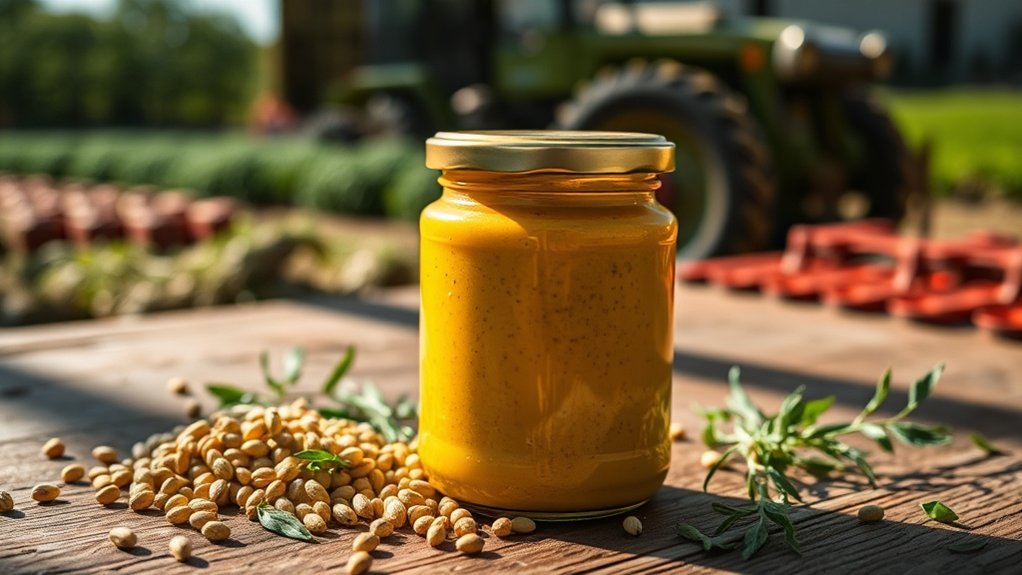
Understanding ingredient lists represents only half the picture—the manufacturing process itself can determine whether your mustard meets vegan standards.
Critical production methods affecting vegan status:
- Wine filtration processes: Dijon mustards containing white wine may use fining agents like isinglass (fish bladder) or egg whites during production, making the final product non-vegan despite these substances not appearing on labels.
- Sugar processing: Bone char filtration in sugar refinement introduces animal products indirectly into mustard formulations.
- Facility cross-contamination: Shared equipment processing both mustard and animal-based condiments can compromise vegan integrity through residue transfer.
- Vinegar clarification: Some vinegars undergo animal-derived filtering processes before incorporation into mustard recipes.
You’ll need to contact manufacturers directly or seek certified vegan products to verify production methods meet your standards.
Making Your Own Vegan Mustard at Home
Creating your own vegan mustard at home gives you complete control over ingredients while assuring no animal-derived additives enter your condiment.
You’ll need just mustard seeds, vinegar, water, and optional spices—all naturally plant-based components that deliver authentic mustard flavor.
This simple preparation method allows you to customize texture and taste while maintaining the nutritional benefits of mustard seeds, including their omega-3 fatty acids and selenium content.
Basic Vegan Mustard Recipe
Making vegan mustard at home requires just three core ingredients: mustard seeds, vinegar, and salt. These simple components from mustard plants create an authentic condiment that rivals store-bought vegan Dijon mustard.
Follow these steps for perfect results:
- Combine 1 cup mustard seeds (yellow or brown) with 1 cup vinegar (apple cider or white) and soak for 24 hours to soften.
- Blend the soaked mixture with a pinch of salt and optional spices like turmeric or garlic powder until reaching your preferred consistency.
- Adjust flavor with vegan sweeteners such as maple syrup or agave nectar.
- For smoother texture, strain through a fine mesh sieve; for grainy mustard, leave seeds partially blended.
Store your finished mustard in an airtight refrigerated container, where it’ll maintain quality for several weeks.
Flavor Variations and Tips
Once you’ve mastered the basic recipe, you can transform your homemade mustard into countless flavor profiles by selecting different mustard seed varieties and additions.
Yellow seeds create mild mustard, while brown or black seeds deliver intense heat similar to dijon mustard. You’ll improve tanginess by adjusting vinegar and water ratios in your base mixture.
For sweet variations, incorporate maple syrup or agave into your mustard blend. These natural sweeteners work perfectly in vegan potato salad dressings.
Increase complexity by adding turmeric for earthiness, garlic powder for savory depth, or smoked paprika for subtle smokiness.
Store your creations in airtight containers and refrigerate for up to one month. This guarantees you’ll maintain prime freshness and flavor intensity for all your culinary applications.
Culinary Applications and Pairing Ideas for Vegan Mustard
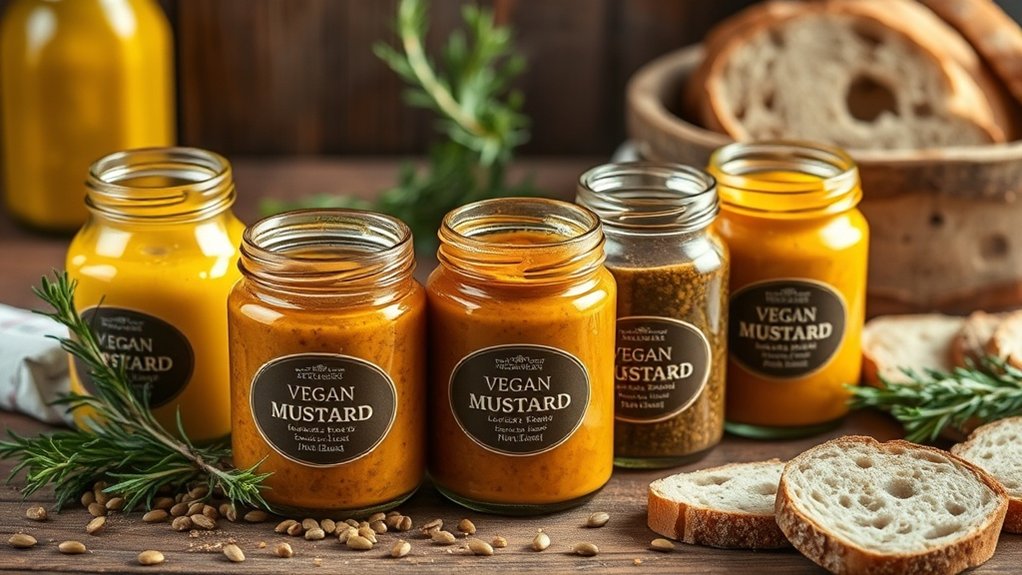
Anyone checking out plant-based cuisine will find that vegan mustard serves as a versatile flavor booster across numerous culinary applications. This condiment’s tangy profile improves both simple and complex dishes while maintaining nutritional integrity.
Consider these practical pairing strategies:
- Protein Improvement: Use mustard as a marinade for tofu or tempeh, which tenderizes plant-based proteins while infusing bold flavors.
- Vegetable Preparation: Pair mustard sauce with roasted vegetables to complement their natural sweetness with tanginess.
- Dressing Innovation: Create zesty potato salad dressings that transform traditional recipes into appealing vegan alternatives.
- Sauce Development: Incorporate mustard into dips for pretzels or create distinctive sauces for lentil burgers.
From sandwiches to veggie dogs, vegan mustard consistently delivers flavor without compromising dietary principles or nutritional value.
Common Questions About Mustard and Veganism
Most yellow and spicy brown mustard varieties contain only mustard seeds, vinegar, salt, and spices—making them vegan-friendly.
However, honey mustard isn’t vegan due to its honey content.
Dijon mustard presents challenges since some brands use white wine filtered through animal-derived agents. You’ll need to verify that any mustard that’s labeled Dijon uses vegan-friendly processing methods.
Check labels carefully for problematic additives including honey and white sugar, which may involve animal-product processing.
Reliable vegan brands include Annie’s Naturals, Grey Poupon with confirmed vegan wine, and Heinz Organic Yellow Mustard.
These manufacturers provide transparent ingredient sourcing, assuring their products align with plant-based dietary requirements.



